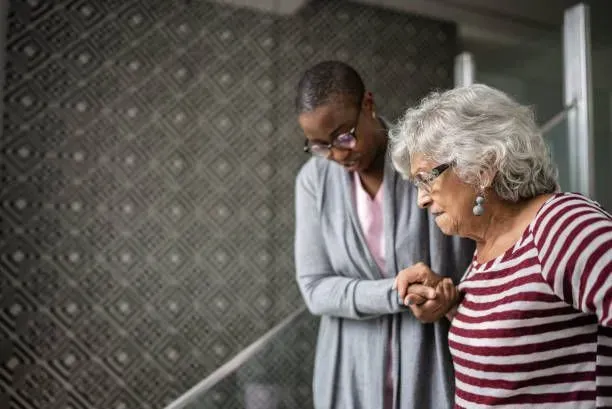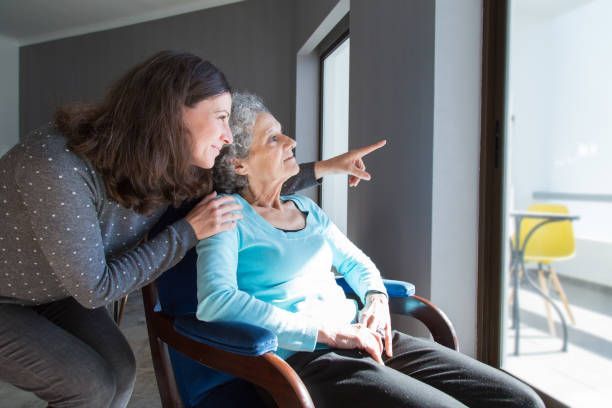Communicating with Hearing, Visually, or Memory Impaired Seniors

7 Day Home Care is dedicated to providing exceptional and affordable in-home care throughout NYC and more, including Manhattan, Queens, Brooklyn, Nassau County, and Suffolk County, New York. Our caregivers play a pivotal role in ensuring the well-being and comfort of elderly adults, including those with impairments such as hearing, vision, or memory loss. Effective communication strategies are crucial in fostering meaningful connections and understanding with these individuals, promoting a sense of dignity and respect. In this article, we review the importance of person-centered communication techniques for seniors with impairments and explore how to apply these strategies to manage challenging client behaviors and events.
Communication Strategies for Elderly Adults with Impairments
Hearing Impairments: According to the National Institute on Deafness and Other Communication Disorders, approximately 15% of American adults aged 18 and over report some trouble hearing. When communicating with seniors experiencing hearing loss, caregivers should use clear, simple language, speak face-to-face, and minimize background noise. Employing visual aids and gestures can also enhance understanding and engagement.
More, communicating with seniors who have hearing loss requires specific strategies to ensure effective and meaningful interaction. It's essential to create an environment that supports clear communication and encourages a sense of inclusivity and understanding. Here are some key tips for communicating with seniors experiencing hearing loss:
- Face-to-Face Communication: Position yourself in front of the individual, maintaining eye contact and ensuring that your face is well-lit. This facilitates lip-reading and allows the senior to observe facial expressions and gestures, aiding in comprehension.
- Speak Clearly and Slowly: Enunciate your words clearly and avoid speaking too rapidly. Use a moderate tone of voice, as shouting can distort your words and make lip-reading more challenging. Simplify your sentences and avoid complex or convoluted language.
- Minimize Background Noise: Reduce or eliminate any background noise that may interfere with the conversation. Choose quiet settings for discussions, turn off noisy appliances or devices, and close windows to reduce outside distractions.
- Use Visual Aids: Supplement verbal communication with visual aids such as written notes, diagrams, or relevant images to reinforce the message. Utilize gestures and facial expressions to convey emotions and intentions, enhancing the overall understanding of the conversation.
- Encourage Patience and Understanding: Be patient and understanding, allowing the individual sufficient time to process and respond to the information. Avoid interrupting or finishing their sentences, as this can be disorienting and discouraging for the senior.
- Provide Assistive Devices: Introduce and demonstrate the use of hearing aids or other assistive listening devices if the individual has access to them. Ensure that the devices are properly adjusted and functioning optimally to facilitate improved hearing during conversations.
- Check for Understanding: Frequently check for understanding and encourage the individual to ask questions or seek clarification if needed. Validate their efforts to communicate and express empathy and support throughout the conversation.
By implementing these communication strategies, caregivers can create an inclusive and supportive environment for seniors with hearing loss, fostering better understanding and strengthening the overall quality of interactions and relationships.
Vision Impairments: The American Foundation for the Blind reports that over 7.3 million Americans aged 65 and older are affected by severe vision loss. To effectively communicate with seniors with vision impairments, caregivers should describe their surroundings, use contrasting colors, and provide written materials in large print or Braille. Offering guidance and support during movement can also instill a sense of safety and trust.
When communicating with seniors who have vision impairments, it's crucial to create an environment that promotes clear and effective interaction. Here are some key strategies for facilitating communication with visually impaired seniors:
- Verbal Descriptions: Provide verbal descriptions of your surroundings, including any relevant objects or people in the vicinity. This helps orient the individual and ensures that they have a comprehensive understanding of their environment.
- Use Clear and Concise Language: Use simple and straightforward language, avoiding jargon or complex terminology. Speak in a calm and reassuring tone to instill a sense of comfort and ease during conversations.
- Offer Guidance and Support: Offer your arm or hand to guide the individual when moving to different locations. Communicate clearly about any changes in direction or potential obstacles in their path, ensuring their safety and well-being.
- Use Tactile Cues: Incorporate tactile cues such as textured markers, Braille labels, or raised buttons to help the individual navigate their surroundings independently. Provide tactile information about objects or items that they may need to interact with.
- Provide Written Materials in Accessible Formats: Offer written materials in large print or Braille, depending on the individual's preferred reading method. Ensure that any written communication is easily accessible and tailored to their specific needs.
- Encourage Open Communication: Foster an environment of open communication, encouraging the individual to express their needs, preferences, and any challenges they may be facing. Actively listen to their concerns and provide empathetic support and guidance.
- Utilize Contrasting Colors: Use high-contrast colors for important information or materials to improve visibility. Ensure that any printed materials or signs have a clear contrast between the text and the background for easier readability.
- Respect Personal Space: Approach the individual within their personal space, announcing your presence before initiating a conversation. This allows them to feel comfortable and aware of your proximity, avoiding any potential discomfort or surprise.
By implementing these communication strategies, caregivers can create an inclusive and supportive environment for seniors with vision impairments, enabling them to navigate their surroundings with confidence and fostering a sense of independence and well-being.
Memory Loss: The Alzheimer's Association highlights that over 6 million Americans are living with Alzheimer's disease, which can significantly impact memory and cognitive function. Caregivers should maintain a consistent and familiar routine, use clear and concise language, and employ memory aids such as photographs or familiar objects to facilitate communication and evoke positive memories.
Communicating with seniors who have memory loss requires patience, empathy, and the use of specific strategies to ensure effective and meaningful interaction. Here are some key tips for communicating with seniors experiencing memory loss:
- Maintain a Calm and Reassuring Tone: Speak in a calm and reassuring tone to create a sense of comfort and ease during conversations. Avoid using a condescending or patronizing tone, as this can be off-putting and may lead to increased confusion or frustration.
- Use Simple Language and Clear Instructions: Use simple and straightforward language, breaking down complex information into smaller, more manageable chunks. Provide clear and concise instructions, avoiding ambiguous or open-ended questions that may lead to confusion.
- Repetition and Reinforcement: Repeat important information or key points to reinforce understanding and memory retention. Repetition can help seniors with memory loss better retain and recall essential details, fostering a sense of familiarity and comprehension.
- Utilize Visual Cues and Reminders: Incorporate visual cues and memory aids such as photographs, familiar objects, or written notes to trigger memory recall and facilitate a deeper understanding of the conversation. Visual cues can serve as effective prompts for recalling past events or personal experiences.
- Encourage Positive Recall: Encourage the senior to share their stories and experiences, fostering a sense of connection and engagement. Listening to their narratives and reminiscing about positive memories can evoke a sense of comfort and well-being, fostering a stronger emotional bond and enhancing communication.
- Establish a Consistent Routine: Maintain a consistent and predictable routine to provide a sense of structure and familiarity for the senior. Consistency can help alleviate anxiety and confusion, enabling the individual to feel more secure and confident in their daily interactions and activities.
- Patience and Empathy: Practice patience and empathy during interactions, acknowledging the challenges that come with memory loss. Approach the senior with understanding and compassion, offering support and reassurance throughout the conversation.
By incorporating these communication strategies, caregivers can create a supportive and compassionate environment for seniors with memory loss, fostering meaningful connections and promoting a sense of comfort and well-being.
Applying Effective Communication Skills to Manage Difficult Behaviors
Managing difficult client behaviors and events requires caregivers to employ effective communication strategies that foster empathy, patience, and understanding. When confronted with challenging situations, it is essential for caregivers to:
- Remain Calm and Empathetic: Maintaining a composed and empathetic demeanor can help diffuse tense situations and foster a sense of trust and security for the elderly adult.
- Active Listening: Actively listening to the concerns and needs of the individual can provide valuable insights into their perspective, enabling caregivers to respond in a supportive and understanding manner.
- Validation and Reassurance: Validating the individual's feelings and offering reassurance can help alleviate anxiety and build a sense of comfort and trust in the caregiver-client relationship.
At 7 Day Home Care, we recognize the significance of effective communication strategies in providing compassionate and personalized care for elderly adults with impairments. By understanding the unique communication needs of individuals with hearing, vision, or memory loss, our caregivers are equipped with the necessary tools to foster meaningful connections and create a supportive environment that promotes overall well-being and quality of life for our esteemed clients. Please contact 7 Day Home Care today at 516-408-0034 to learn more about our award winning and affordable in-home care in Manhattan, Queens, Brooklyn, Nassau County, and Suffolk County, New York.
Brian Callahan
7 Day Home Care










